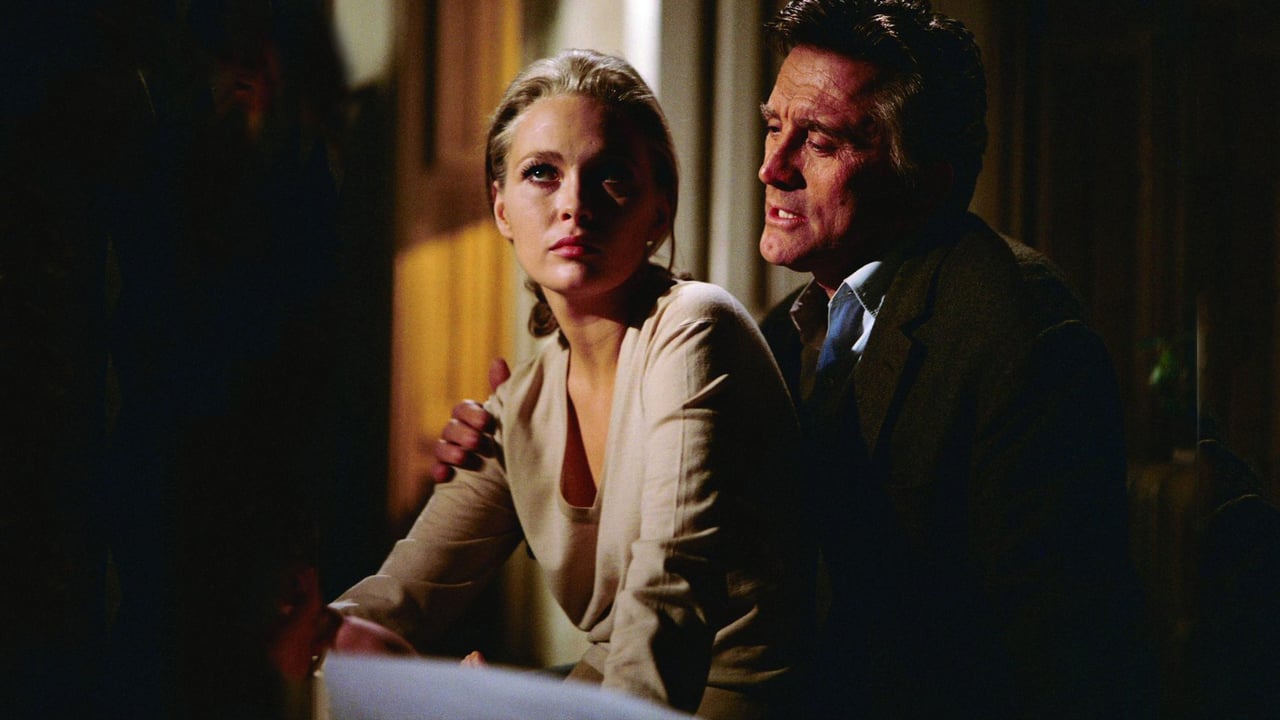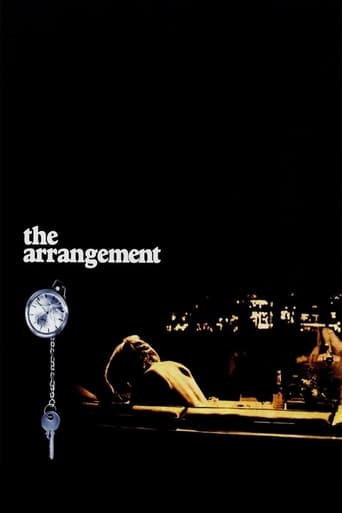

Elia Kazan made "The Arrangement" in 1969 after having first published it as a novel. It's a difficult film but ultimately a rewarding one. It begins along the lines of a rather heavy-handed satire on consumerism before turning into a very late sixties psychodrama about a mid-life crisis which Kazan chooses to film in the fractured style of a European art-movie. The central character is Eddie Anderson, (not his real name; he changed it from the original Greek), and from flashbacks we are lead to believe he's the son of the boy from "America, America" who has now become Richard Boone. The film opens with Eddie's bizarre suicide attempt when he drives his sports car under the wheels of a truck and as it moves forward, to some kind of redemption. It also keeps skipping back to the events in Eddie's past that have lead up to that moment when he felt his life was no longer worth living. Kirk Douglas plays Eddie superbly, in what is really a very difficult role. His long-suffering wife is an equally superb Deborah Kerr, mixing acidity and sweetness to an almost alarming degree as she tries to comprehend what it is that's driving her husband. In the role of Eddie's mistress Faye Dunaway is less successful simply because her character is too much of a contradiction; she seems to undergo a complete change of personality. However, there's fine work from Hume Cronyn as Eddie's slimy lawyer and Boone is splendid as the gruff, seemingly uncaring father. The movie itself wasn't a success and critics were heavily divided, many feeling that Kazan had stepped outside of his comfort zone and had largely failed. However, the magazine 'Films and Filming', a bible of British film criticism at the time, selected it as the year's best film from any source. It was hardly that but it is still Kazan's last really good movie, an utterly essential part of one of the great canons of work in world cinema and it certainly shouldn't be missed if you get the chance to see it.
... View MoreEddie Anderson (Kirk Douglas) is rich, successful and losing his mind. You can tell this because as he's driving to work in his fancy convertible, he deliberately smashes his car--nearly killing him. Following this, he's distant and uncommunicative--slipping deeper and deeper into a fantasy world. He's dreaming of his lover (Faye Dunaway)--a woman who left him a year and a half ago. In the meantime, his wife (Deborah Kerr) is beside herself--she has no idea what to do. Through the course of the film, you see a man on the edge of sanity--a man having perhaps the world's world mid-life crisis. Because he's reached this age and hates who he is and what he's become--that's why this crisis is so intense.While I felt this was a painful and unpleasant film (much of it because you don't like ANYONE in the film--especially the leading man), this is not to say the picture is without merit or style. Director Elia Kazan (from his novel) creates a bizarre portrait of a man in crisis--and does it in very, very strange and creative ways. Very often through the course of the film, it becomes more and more difficult to determine what is real and what is not--and Douglas' character has conversations with himself (using a split screen), walking back in time to his childhood and examining his relationship with his parents and even runs around in the buff! It's all very artsy, surreal and strange--though not exactly something I enjoyed. It's also very adult and a film that most folks would find challenging at best, though the film would probably speak best to someone in mid-life--someone who is questioning who they are and what they are. Strange to say the least--and more like an Ingmar Bergman film than one you'd expect from Kazan. In fact, I liked the film's style much more than I liked the actual story. Worth seeing as a failed but intriguing experiment.By the way, the clip of the father on the boat coming to America is from another Kazan film, "Amerika, Amerika" (1963).
... View MoreThis may be Kirk Douglas's finest dramatic performance. He's always had a tendency to hog the screen, sometimes effectively, as when, in a moment of epiphany, he silently lets his jaw drops and rolls his eyes heavenward. He does it when trapped in a cave in "The Juggler" and at the end of "Champion" when he stares at his broken hand. But he doesn't pull any tricks here. Maybe Elia Kazan talked to him about it. Kirk turns in a quiet, thoughtful performance of a man going mad because he never fulfilled his father's dreams -- I guess. It's a little confused.At the opening, we're introduced to Douglas at a meeting of the ad agency he works for. They're marketing a cigarette, Zephyr. Douglas's self-confident presentation of the marketing campaign shows us a hollow man at his job, apparently good at his job and reveling in it. He gets up smiling in the morning, grooms himself wordlessly while his devoted wife, Deborah Kerr, chatters in the background. Then he drives to work and there follows a startling moment. We've all been on freeways in the middle lane, with deafening eighteen-wheelers roaring along indifferently on either side of us, at the same speed. And Douglas, still with a grin painted on his face, folds his arms across his chest and lets the car wander one way or another until, with a savage grimace, he yanks his convertible under one of the trucks.I'm afraid that from there it's mostly downhill, except for some good performances and nice local color from photographer Robert Surtees.I won't try to describe the plot. It has something to do with Douglas's self-destructive impulses, his being torn between two women, his conflict with his old-world father, Richard Boone. The film goes into considerable detail.Kazan has always been an impressively innovative director. There is a scene near the beginning of "Panic in the Streets," involving a murder, that involves some exquisite camera choreography and lasts a long time, all captured in one take. And in "East of Eden" he places the camera almost on the ground, shoots from behind Timothy Carey's legs, as Carey fondles a black jack and tries to tempt James Dean to come a little closer.The innovations were fresh and were always his own. Not here. They're distinctly derived from the styles and fads of the mid-60s, including some Batman-like ZLONKs and POWs! I suppose they're meant to amuse but they fall with a thud. There's a good deal of instant cutting, of flash forwards, of tableaux of family arguments remembered from childhood while the adult Douglas walks around and pleads with the participants. Woody Allen was doing the same thing.On top of that, the movie doesn't really make much sense. I'm still not sure how it all winds up. A shame, really. A couple of outstanding performances in a film whose plot resembles the inside of a kaleidoscope or some kind of demonically spinning Archimides spiral. The fact that I can't make up my mind whether the plot resembles a kaleidoscope or a spiral is symptomatic of the damage it left in its path.
... View MoreElia Kazan may have bared his tortured soul in this autobiographical novel, but someone else was needed to bring it to the screen. Then again I'm not sure anyone could have made an entertaining film out of so dislikeable a subject.The Arrangement is ostensibly Elia Kazan telling his story of his relationship with a tyrannical father which is the root cause of the middle aged angst he now faces. Our protagonist is not a celebrated film director, but Kirk Douglas a rich and successful advertising executive who one fine day decides to go out in the way that Princess Diana did.It was not as fatal as poor Diana's crash. But all through this film you kind of wish he'd been put out of his misery. This man is selfish beyond all comprehension, narcissistic to the last exponent. Kirk Douglas has played some pretty rotten people on the screen, but even the cold blooded bank-robber/killer he played in his next film, There Was A Crooked Man, had far more going for him than this one.He's married to Deborah Kerr who was coming up short with decent film roles in the latter part of the Sixties. She's the long suffering wife in this one and initially you feel sorry for her. But after a while I got the impression she was just glorying in her martyrdom as the long suffering wife. Douglas even knocks up his mistress Faye Dunaway and even after she gives birth and the child is thrown in her face, she won't leave him.What she'd rather do is scheme with family lawyer Hume Cronyn and family doctor Harold Gould to get Douglas sent to the booby hatch. Not that he isn't giving them all plenty of good reason.Richard Boone is Douglas's father and he blusters and shouts his way through the part the Anthony Quinn does in his more bravura roles. Kazan didn't have a tight rein on the cast. Or perhaps they knew this film was a travesty and each was determined to overact and be noticed the most.Not the finest hour for all the talented people involved.
... View More